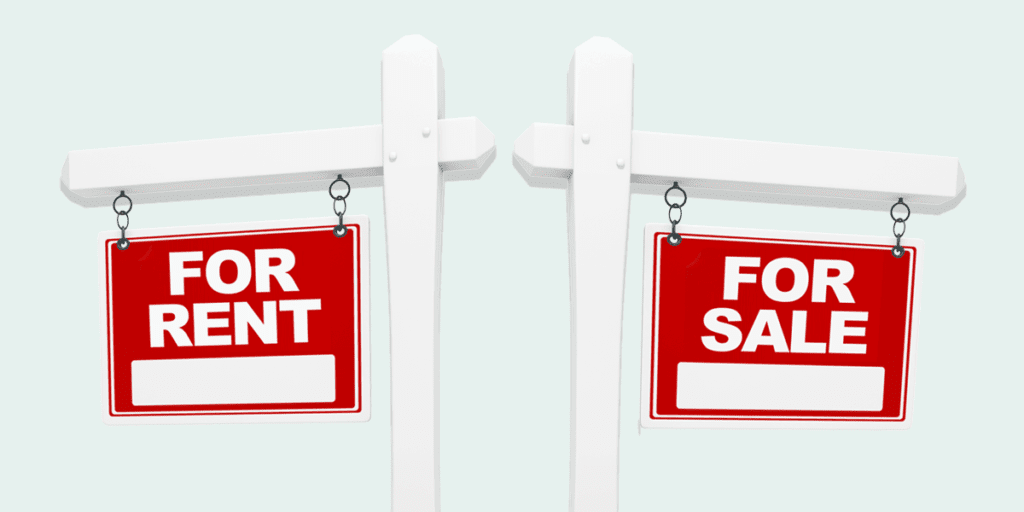Perhaps you’re moving from an area with high demand and interested in paying down your mortgage while your home appreciates. Or, perhaps you inherited a home and haven’t made up your mind on whether you’d like to sell or rent the property.
Should I Sell or Rent My House?
Renting a property is a great way to pay down a mortgage and may even return a profit after covering all the expenses associated with home ownership. The Department of Housing and Urban Development estimates that between 10 and 11 million landlords are individuals who manage an average of 1 – 2 units each. While the earning potential of being a landlord is appealing, it won’t be the right choice for everyone.
Managing a property is a huge time commitment. Before marketing a home for rent, the property needs to be habitable and attractive, to attract ideal tenants. Keep in mind that insurance premiums on rental property are higher then a primary residence and capital gains on any appreciation will be taxed should you choose to sell the home at a later date.
If you find yourself on the fence, faced with the decision of whether to sell or rent a home, consider the following.
Profitability
Rental property can be very lucrative. A common sentiment shared among many real estate investors is that there’s no point in renting out a home if it won’t generate a profit. While this may be misleading, at face value, it’s important to consider whether your rental income will surpass your operating costs.
Look at other rental properties in your neighborhood to get an idea of what you can charge. We use https://www.rent-o-meter.com to gain insights on a range of rental rates for a property type in any given area. Once you understand your market rent, add up your mortgage payment, property taxes, insurance, HOA fees (if any), property management fees, and any utilities you’ll be paying. In addition to these fixed costs, it’s prudent to account for vacancy and capital expenditures. While these costs can vary based upon the condition of the property and your aptitude for being a landlord, a good rule of thumb for vacancy is 5% and maintenance reserves, or cap ex, 10%.
Next, compare your rental profits to the net proceeds from the sale of your home. For a complete look at how to calculate net proceeds be sure to check out How to Calculate Net Proceeds. For the sake of example, let’s say you stand to gain $300,000 from the sale of a home that will generate $5,500 per year in rental profit, you may be better off liquidating that value to invest in something with a higher return. Goldman Sachs predicts that the S&P 500 will return 6% annualized over the next 10 years, which means you’d earn more in this scenario if you sold the house and invested the proceeds in the stock market than if you rented your home. If you’re not keen on the stock market, consider selling or refinancing the property and leveraging debt to put 20% down on multiple rental properties, which will generate a more hardy return.
It’s important to note, you should consider your home’s potential for appreciation when making this comparison. If you live in an area with high demand where prices are expected to climb, it might be prudent to hold onto the home and bank on appreciation.
Time and Energy
Consider the burden on your time and energy it will take to get the property in rentable condition, market the property to potential tenants, maintain the home, and contend with any issues.
Getting your home ready to rent for top dollar can require almost as much effort as preparing it for sale. You’ll need to clean, make necessary repairs, and keep an eye on improvements that will maximize your monthly rent. Refinishing hardwood flooring or installing new carpets, a fresh coat of paint, or updating appliances are all great ways to maximize rent. And while being a landlord may not be a full-time job, you’ll need to be flexible to accommodate vacancy and ongoing maintenance issues that may require attention.
Even with careful scrutiny, you may find yourself with a tenant who stops paying rent and may need to be evicted. Eviction, involves filing a notice with the local court and scheduling a hearing. You’ll also be responsible for cleaning the property and may find yourself with a handful of repairs needed to get the property rent ready again in the event a disgruntle tenant leaves a mess on the way out.
Tax Liability
In most cases, if you profit from the sale of a property, you need to pay capital gains taxes that will vary depending on your tax bracket. However, if you owned your home for at least two years and lived in it for at least two of the previous five years, the IRS allows you to exclude from your income up to $250,000 in profits ($500,000 for married couples filing jointly).
Let’s say you’re married and stand to earn $300,000 from the sale of your primary residence. If you sold today, you wouldn’t be liable for any taxes on that income. If you choose to rent the property for five years and then sell, you may be liable for up to $60,000 in taxes. To make sure you benefit from renting your home, determine whether your rental profit plus any additional appreciation are likely to exceed those tax savings. While nothing is certain in real estate, you can exercise prudence by carefully weighing each choice and hedging losses.
Should I sell?
You’ll need to weigh all factors carefully when making your decision about whether to sell or rent a home. There are a few scenarios that might preclude you from renting.
- Perhaps your house is in disrepair and you don’t have the funds available to repair it. If you can’t afford to get your home in rentable condition, consider requesting an offer from CoreMark. Our goal is to return a fair price for your home with no hidden fees, and you won’t hemorrhage cash getting your home in tip top sales condition.
- Perhaps you’re pressed for cash. If you’re strapped for cash, you may not be able to take the time to wade through the sales process or rent your home. If you choose to sell CoreMark, we’re happy to offer a $10,000 cash advance from the proceeds of the sale after inspection.
- Perhaps the thought of managing tenants, isn’t a welcome addition to your life. If professional management is not in your budget and you’re not keen on managing tenants yourself you’ll avoid a ton of stress by selling your house as-is.
If you’re still on the fence about selling your property be sure to check out How to Decide if CoreMark Is Right for You.
Many sellers that choose CoreMark are going through a transition in their life that may be unfamiliar. For homeowners who may not have the time, money or interest in a home renovation project, that’s where a homebuyer like CoreMark Homes can deliver extraordinary value. Selling a home quickly and with no showings, especially for people with health issues or who may need to relocate for work are great candidates for a sale to CoreMark. We also, specialize in assisting with the sale of estates in probate in which family members may not be nearby and we can offer an appealing, quick sale. All of the above are ideal candidates for selling a property to Brogue. If you would like a no obligation cash offer complete a quick form and someone will be in contact. We look forward to speaking with you.

